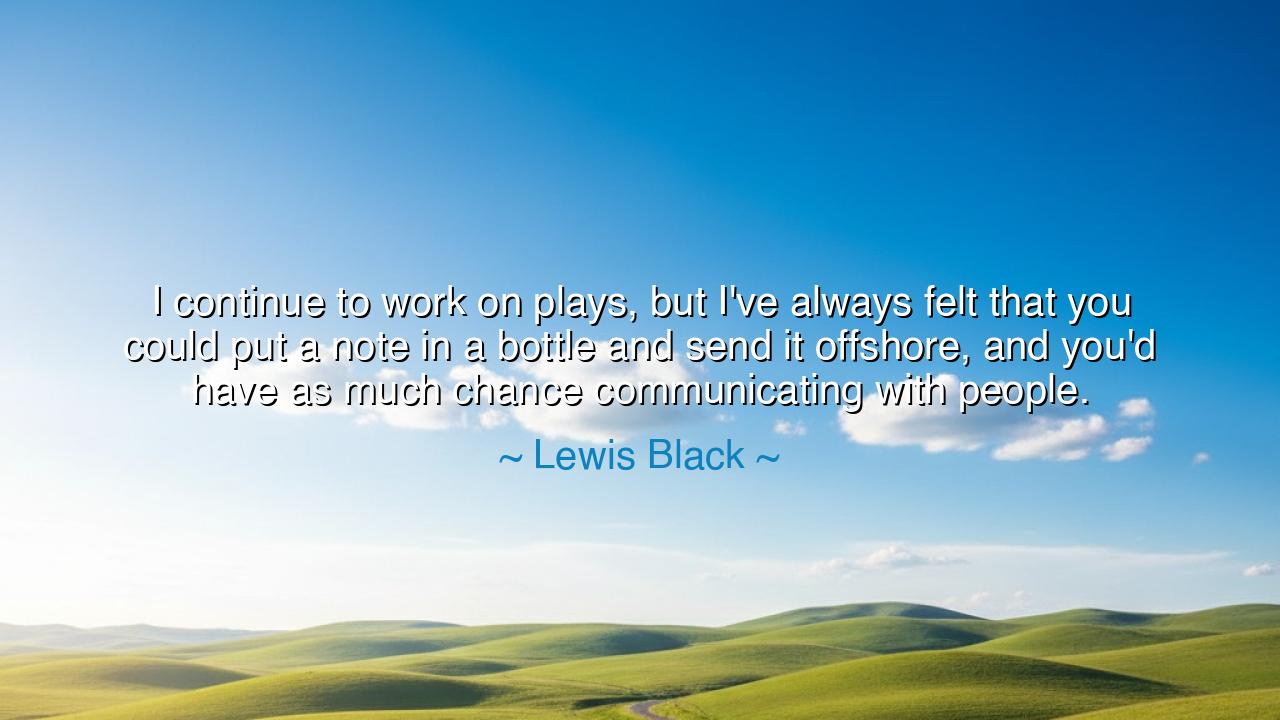
I continue to work on plays, but I've always felt that you could
I continue to work on plays, but I've always felt that you could put a note in a bottle and send it offshore, and you'd have as much chance communicating with people.






O children of the earth, listen closely to the words of Lewis Black, for they reveal a profound truth about the nature of communication and the struggle to reach the hearts of others. In his words, "I continue to work on plays, but I've always felt that you could put a note in a bottle and send it offshore, and you'd have as much chance communicating with people." Here, Black speaks not merely of the act of creation, but of the often elusive nature of communication itself. He compares his work—his plays, his words—to a note cast into the vast, unpredictable ocean, hoping that someone, somewhere, might find it and understand it. In this, there is a great truth: that in a world full of noise, of distractions, and of conflicting voices, to communicate deeply with others is a rare and uncertain act.
The image of a note in a bottle, carried by the winds and tides of the sea, is both powerful and humbling. It speaks to the vulnerability of the artist, the writer, the creator. When one pours their soul into a work—be it a play, a song, or a painting—they cast a piece of themselves out into the world, hoping that it will be received, understood, and embraced. But how often does this hope go unanswered? How often do we pour our hearts into our work, only to have it disappear into the void, as though lost to the winds? This is the deep anguish of the creator—the recognition that communication is not always reciprocal, and that the world may not always hear what we wish to say.
Consider the ancient poets, who, in their time, sought to communicate with generations far beyond their own. Homer, with his mighty epics, cast his words like stones into the river of time. He sought to speak to the hearts of men across millennia, but did he truly believe that his words would echo down the ages? In his time, he would have had no way of knowing that his epics would endure for centuries, that his words would touch the hearts of countless listeners. Yet, like the poet, like the artist, he persisted, knowing that the very act of creation was an offering—a note in a bottle sent offshore, with the hope that it would one day be found.
Shakespeare, too, in his own way, sent his words out into the sea. He created works that spanned the breadth of human experience, plays that would touch the hearts of kings and commoners alike. And yet, in his lifetime, how many of his works were lost to the sands of time? How many voices spoke over his, drowning out his message? And yet, like Black, he continued. For in the act of creating, there is something beyond the hope for understanding. There is a truth that speaks to the soul of the artist—that to create is to touch eternity, even if only for a fleeting moment.
In Black’s words, we hear not only the pain of the artist, but also a call to resilience. To continue working, to continue creating despite the uncertainty of communication, is an act of profound courage. In every note cast into the sea, there is the possibility of being heard. Even when we do not see the fruits of our labor, even when our messages seem to fall on deaf ears, the act of creating is still a victory. For the artist, the writer, and the poet, the act of communication is not always about immediate success—it is about the integrity of the work, the purity of the message, and the hope that it may one day reach those who need to hear it most.
This, then, is the lesson that we must carry with us: that communication is both an act of courage and an act of faith. The world may not always hear us, but we must speak anyway. The winds and the tides may carry our words far from the shores we know, but if we do not cast our messages into the ocean, they will never reach their destination. The act of creation is the act of reaching into the unknown, of sending forth a piece of ourselves into the vast world, trusting that it will find its place. Whether it is heard today, tomorrow, or in centuries to come, the act of creating is its own reward.
And so, we must continue—like Black, like Shakespeare, like Homer—to create despite the uncertainties. We must send our messages into the world, knowing that they may not always be understood, but trusting that they will, in time, find their home. Whether we are writers, artists, or thinkers, we must trust in the power of our words, and in the resilience of the human spirit to connect across time and space. Let us continue creating, casting our notes into the great sea, for in that very act, we touch the hearts of those who will come after us, and perhaps, even those who walk beside us.






AAdministratorAdministrator
Welcome, honored guests. Please leave a comment, we will respond soon